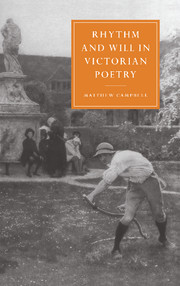Book contents
- Frontmatter
- Contents
- Preface and acknowledgements
- Texts used
- Chapter 1 Introduction: two decisions
- Part One RHYTHMS OF WILL
- Part Two MONOLOGUE AND MONODRAMA
- Part Three MAKING A WILL
- Chapter 6 The drift of In Memoriam
- Chapter 7 Incarnating elegy in The Wreck of the Deutschland
- Chapter 8 The mere continuator: Thomas Hardy and the end of elegy
- Notes
- Bibliography
- Index
- CAMBRIDGE STUDIES IN NINETEENTH-CENTURY LITERATURE AND CULTURE
Chapter 8 - The mere continuator: Thomas Hardy and the end of elegy
Published online by Cambridge University Press: 22 September 2009
- Frontmatter
- Contents
- Preface and acknowledgements
- Texts used
- Chapter 1 Introduction: two decisions
- Part One RHYTHMS OF WILL
- Part Two MONOLOGUE AND MONODRAMA
- Part Three MAKING A WILL
- Chapter 6 The drift of In Memoriam
- Chapter 7 Incarnating elegy in The Wreck of the Deutschland
- Chapter 8 The mere continuator: Thomas Hardy and the end of elegy
- Notes
- Bibliography
- Index
- CAMBRIDGE STUDIES IN NINETEENTH-CENTURY LITERATURE AND CULTURE
Summary
The third scene of Act v of the second part of Thomas Hardy's The Dynasts relates the winning of the assent of the Princess Maria Louisa to a marriage to the monster, Napoléon Bonaparte. Metternich says that it is her father the Emperor Francis’ ‘privilege to pronounce / Which track stern duty bids you tread therein’. Francis understands exactly Metternich's object: to effect an alliance, through marriage, of the empires of France and Austria, and so isolate the other great competing dynasty of mainland Europe, that of Russia. But like much of Hardy's epic drama, the scene plays so well because it rubs the Immanent Will, which drives the conflict of great dynasties in world history, against a little human drama, in this case a sad family scene. The Emperor Francis refuses to compel his daughter to marry Napoléon:
Without constraint or prompting I shall leave
The big decision in my daughter's hands.
Before my obligations to my people
Must stand her wish.
For Hardy, of course, such big decisions are rarely made by mere humans in the great plan which is The Dynasts.
For Maria Louisa herself ‘The big decision’ is hedged round with equal parts of historical necessity and the sense of duty which comes with the obligations of her noble birth. Her father cannot speak to her in person, so he sends Metternich to announce the forthcoming marriage and to achieve her consent.
- Type
- Chapter
- Information
- Rhythm and Will in Victorian Poetry , pp. 210 - 238Publisher: Cambridge University PressPrint publication year: 1999

